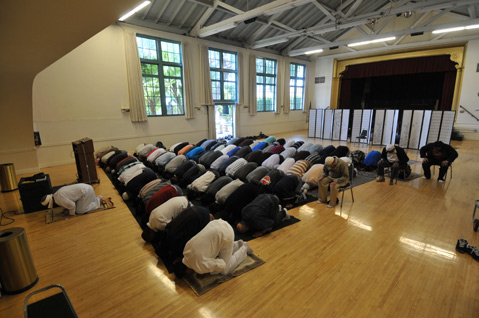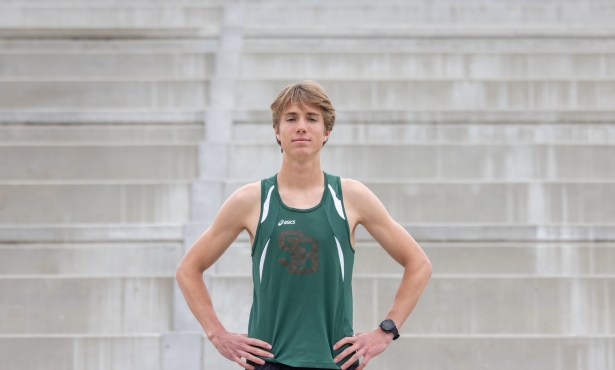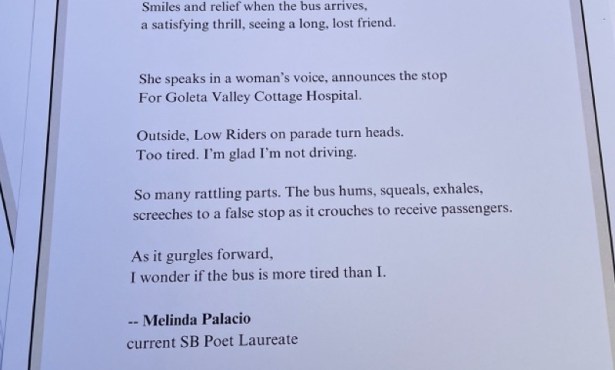Ramadan: A ‘Scorching Hot’ Holiday
How Santa Barbara Muslims Honor Their Month of Fasting, Prayer, and Spiritual Purification

The month of June heralds the beginning of summer, the end of the school year, and, for many Muslims celebrating Ramadan, the time for fasting and self-reflection.
Ramadan is the holiday observed internationally by Muslims during the ninth month of the Islamic calendar. As the third of the Five Pillars of Islam, Ramadan is particularly significant for Muslims who believe that this is when the Koran was first revealed to the prophet Mohammed.
“[Ramadan] has to do with fasting on the lunar month which is called ‘Ramadan,’ which comes from the Arabic word for ‘scorching hot,’” explained Yama Niazi, who is the imam, or clergy leader, of the Islamic Society of Santa Barbara (ISSB). “The idea is that it burns away sin….Muslims are purified from the sins they might have committed in the year.”
This year, Ramadan began on Wednesday, June 17, when many Santa Barbara Muslims participated in “Taraweeh,” which is the recitation of the entire Koran after the evening prayers at the Goleta Valley Community Center. The center has long served as a place of worship for the region’s Muslims, who are also working to build their own mosque and community center in Goleta on the corner of Los Carneros Road and Calle Real. They purchased that property in 2001 and have spent the past few years working hard toward completing the goal.
“Slowly but surely it’s moving along,” said Niazi of the project, citing some of the details that still must be finalized, such as the mosque’s colors. “There is no problem, it just takes a while to have a place of worship in Goleta,” explained Niazi, emphasizing that the slow progress of the project has been a matter of logistics rather than any actual opposition from the city or citizens.
Niazi grew up in Santa Barbara and has served as imam since 2008. He first started out as what he calls “backup imam” and eventually maintained full-time imam status. The position of imam he said is somewhat similar to the position of the rabbi in Jewish synagogues.
During the 30 days of fasting, those participating in Ramadan will refrain from food and drink from sunrise to sunset as well as abstain from sexual relationships. Many Muslims may also make the pilgrimage to Mecca in Saudi Arabia, place of great historical and cultural significance in Islam. The end of Ramadan occurs on Eid, which indicates the start of the next lunar month. During this time, Muslims will celebrate the end of their fasting period by feasting and reciting Eid prayers.
“The fast includes staying away from sin,” Niazi said. “You are fasting from the possibility of committing any type of sin” such as offensive language, temptation, and negative thoughts. According to the Koran, fasting allows Muslims the ability to acquire taqwa or in Niazi’s words, “a mental awareness of the presence of God.”
According to Niazi, while the primary aspects of Ramadan include fasting and prayer, another major component of Ramadan is reflecting on and helping those less fortunate. Because Ramadan is one of the most important times for Muslims, Niazi believes the charitable deeds performed during Ramadan hold even greater significance than when done outside the holiday.
Niazi acknowledged that for non-Muslims not familiar with Ramadan, they may view the practices of fasting and scheduled prayers as burdensome, but Niazi said this month is a special one for Muslims and something to look forward to, not avoid. “Some Americans think Muslims must dread [Ramadan],” Niazi said. “But you’ll often hear Muslims say, ‘I really needed this.’ This month is a very special month and it goes by very fast.”
He continued, “I grew up in Santa Barbara all my life and when I was 18, it was my first experience fasting. It means a lot for Muslims. To a lot of Muslims, it means different things…Each person has a different interpretation of Ramadan.”
Brendan Newlon, who is a student of Niazi, ISSB member, and UCSB doctoral candidate, identified both the physical and moral benefits of Ramadan. “The benefits of fasting are both social and personal,” Newlon said. “You cultivate empathy for the needy who often don’t have any choice but to fast; it’s wonderful for your health and it’s even better for your spirit.”
However, the act of fasting may at times prove difficult in a modern day context. For example, Muslims who have corporate careers may find themselves working around lunch meetings with potential business partners or clients as to not violate the fasting period.
But for Newlon, who will be teaching an “Islam and Modernity” course at UCSB this summer, this modern context isn’t the problem. “Usually, people give the impression that modernity is a situation ‘here and now’ and that Muslims have just arrived from the ancient past,” Newlon said. “The reality is that Muslims have been here all along, practicing their religion in every imaginable social context. Muslims can easily integrate their religious practices with the realities of everyday life wherever they are.”
Of course participating in Ramadan is not without its challenges. For Newlon, the non-9-to-5 nature of roles as student and researcher means he may not always have the chance to leave work behind for Taraweeh. But Newlon cited his Islamic studies as a source of solace especially during the start of Ramadan. “Studying a bit of Islamic history can actually be very reassuring during those intimidating first few days of Ramadan, because it helps you remember that a whole lot of people have done this before and lived to tell about it, and then by the end of the month it feels normal and you wonder what you were ever worried about,” Newlon said.
The city of Santa Barbara is home to a wide array of cultures and differing religious and political views. And while Ramadan is a holiday for the Islamic community, Newlon said he has come across friends who may not be participating in Ramadan, but wish to celebrate the end of the fast with Newlon. “I’ve received warm wishes and even iftar (breaking of the fast) invitations from friends in local Jewish and Christian communities,” said Newlon. “It makes me feel so fortunate to live in a place where people of different religions forge friendships rather than harboring mutual fear.”



